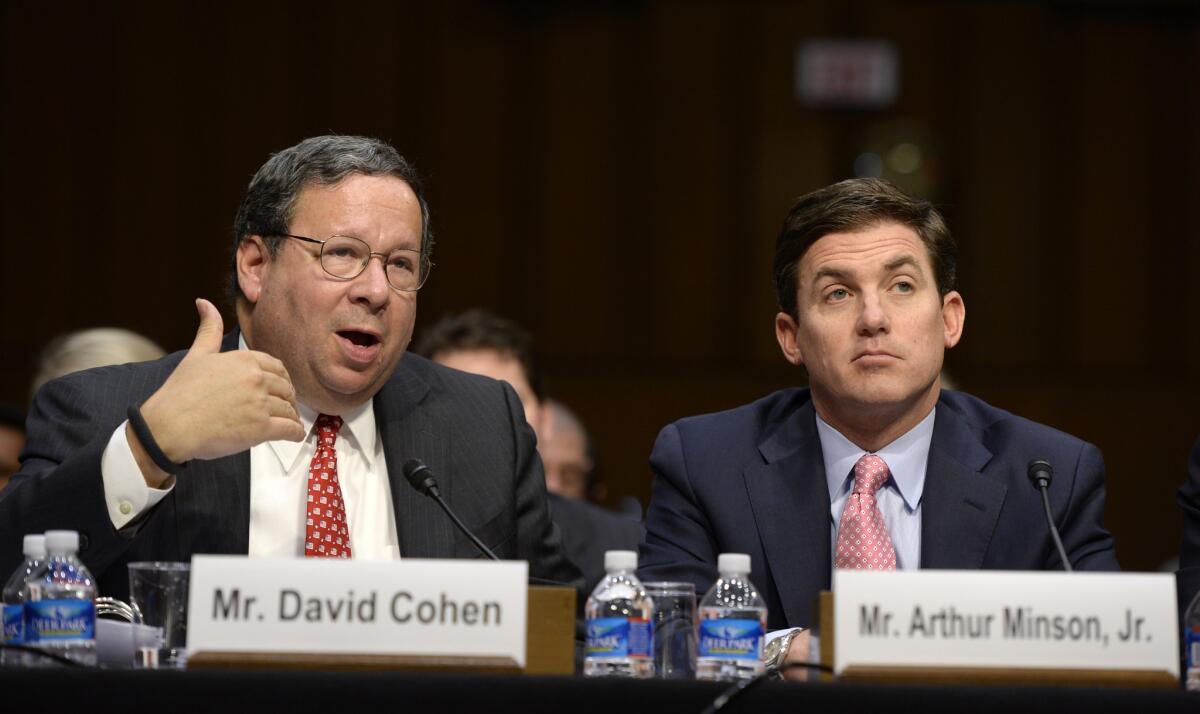Comcast and Time Warner Cable tell Congress: We’ll be good -- promise!

- Share via
Comcast and Time Warner Cable today brought their road show to the U.S. Senate, trying to prove that their proposed $40-billion merger will bring fabulous service to consumers, create new competition and, one would think, end the stalemate over the Crimea.
No, they didn’t actually make that last claim in joint testimony prepared for the Senate Judiciary Committee. But if they did, it wouldn’t have been any more plausible than the two other claims, which they did make.
Take the assertion that this merger of the nation’s biggest and second-biggest cable operators, creating a behemoth controlling nearly half of all high-speed Internet access in the country and reaching some 60% of all cable subscribers, will actually “enhance competition.”
If you can wrap your mind around that, you’ll be prepared to swallow the rest of their guff. Let’s see if we can make sense of it all.
The companies’ basic contention is that providing “highly desirable services in today’s increasingly dynamic and national marketplace ... requires significant capital and R&D investments and technological expertise.”
What they don’t say is why they need to combine to meet this imperative. Last year, Comcast turned a profit of $6.8 billion. Time Warner Cable earned nearly $2 billion.
They say “continued innovation and research and development are essential” to compete with the likes of Google and Apple, and they seem to suggest that these measly profits left them too strapped to invest adequately in innovation. We can’t say that isn’t so; all we can say is that up to now, their investments in R&D have been almost invisible. Neither company spent enough on it last year to even disclose the figure in its annual report.
They assert in their joint testimony that “Comcast has created a culture of innovation from top to bottom,” and as proof they observe that Comcast “now employs over 1,000 developers and engineers.”
That’s some culture. It’s 1,000 R&D employees out of 136,000. You want to know what a “culture of innovation” looks like? It looks like Google, which has 18,500 employees on R&D out of a workforce of nearly 48,000. Comcast doesn’t want to make that sort of investment in innovation; it wants to “innovate” by spending $40 billion to buy Time Warner Cable.
The claim of Comcast and Time Warner to be locked in a do-or-die competitive fight with such firms as Google, Apple, Amazon, and Netflix demands close examination. They submit a chart showing the stock market capitalizations of all these “rivals,” with their own market caps huddled and shivering in poverty over on the right.
As for why the market cap of Comcast versus Apple is relevant to anything, we don’t know. Apple is not a competitor of Comcast and Time Warner -- if anything, it’s a customer, since users of its iPads and iPhones at home are often reliant on Comcast and Time Warner broadband connections to make those devices work. This resembles UPS claiming to be a “competitor” to Amazon, because it carries Amazon’s packages to customers.
The real story of how the Comcast/Time Warner Cable merger will affect competition is told by Gene Kimmelman, chief executive of the consumer advocacy group Public Knowledge, in his written testimony.
He points out that the merged companies’ “unprecedented accumulation of market power,” compounded by their ownership of the content-producer NBCUniversal, will give them the incentive and leverage not to compete with Netflix and Amazon, but to “stifle” that competition. Contrary to the cable firms’ promise that their merger will make them more innovative, he says, it will make them lazier and less innovative.
Kimmelman is backed up by testimony from James Bosworth, CEO of Back9Network, a golf-related cable channel that hopes to compete with Comcast’s Golf Channel. In its efforts to obtain carriage on Comcast system, Back9 got the complete cold shoulder. It did better with Time Warner, obtaining “at least five productive, high level meetings” with executives there last year. As soon as the merger was announced, what happened? The talks “sputtered.”
That’s the landscape Comcast and Time Warner want to bring us. Less innovation, less competition, less service. They’re intent on painting this as some sort of nirvana, but we, and the Senate and the regulators at the Department of Justice and Federal Communications Commission who will be reviewing this deal, should know better.







